七年级英语上册Unit5DoyouhaveasoccerballTheSecondperiodSectionA(2a_2c)教案(新版)人教新目标版
七年级英语上册 Unit 5 Do you have a soccer ball(单词+重点句型)语法解析
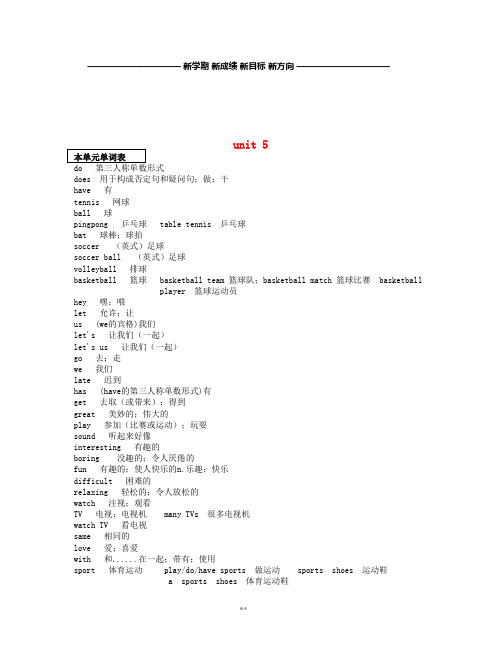
——————————新学期新成绩新目标新方向——————————unit 5does 用于构成否定句和疑问句;做;干have 有tennis 网球ball 球pingpong 乒乓球 table tennis 乒乓球bat 球棒;球拍soccer (英式)足球soccer ball (英式)足球volleyball 排球basketball 篮球 basketball team 篮球队;basketball match 篮球比赛 basketball player 篮球运动员hey 嘿;喂let 允许;让us (we的宾格)我们let's 让我们(一起)let's us 让我们(一起)go 去;走we 我们late 迟到has (have的第三人称单数形式)有get 去取(或带来);得到great 美妙的;伟大的play 参加(比赛或运动);玩耍sound 听起来好像interesting 有趣的boring 没趣的;令人厌倦的fun 有趣的;使人快乐的n.乐趣;快乐difficult 困难的relaxing 轻松的;令人放松的watch 注视;观看TV 电视;电视机 many TVs 很多电视机watch TV 看电视same 相同的love 爱;喜爱with 和......在一起;带有;使用sport 体育运动 play/do/have sports 做运动 sports shoes 运动鞋a sports shoes 体育运动鞋them (they的宾格)他(她、它)们only 只;仅like 喜欢;喜爱easy 容易的;不费力的after 在......以后class 班级;课(近义词:lessen);等级;类别;阶段classmate 同班同学 roommate 室友 workmate 同事 deskmate 同桌schoolmate 校友Bill 比尔(男名)on的用法,详见unit4【解析】on可以表示“通过;使用……方式”,后面通常接表示通信工具的名词。
七年级英语上册Unit5Doyouhaveasoccerball教案新版人教新目标版
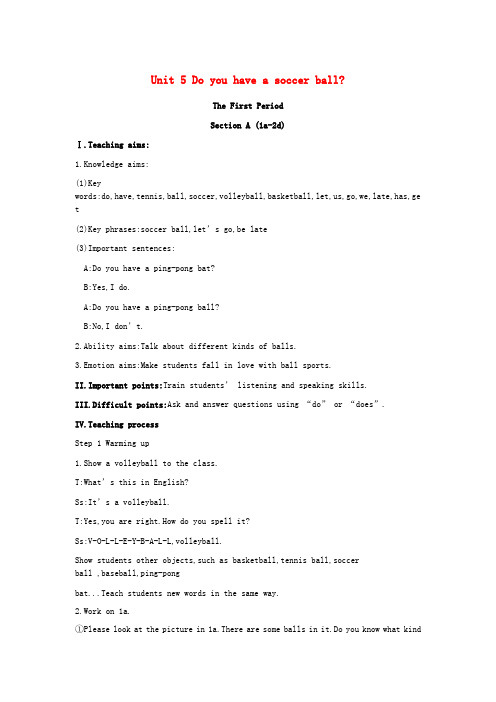
Unit 5 Do you have a soccer ball?The First PeriodSection A (1a-2d)Ⅰ.Teaching aims:1.Knowledge aims:(1)Keywords:do,have,tennis,ball,soccer,volleyball,basketball,let,us,go,we,late,has,ge t(2)Key phrases:soccer ball,let’s go,be late(3)Important sentences:A:Do you have a ping-pong bat?B:Yes,I do.A:Do you have a ping-pong ball?B:No,I don’t.2.Ability aims:Talk about different kinds of balls.3.Emotion aims:Make students fall in love with ball sports.II.Important points:Train students’ listening and speaking skills.III.Difficult points:Ask and answer questions using “do” or “does”.IV.Teaching processStep 1 Warming up1.Show a volleyball to the class.T:What’s this in English?Ss:It’s a volleyball.T:Yes,you are right.How do you spell it?Ss:V-O-L-L-E-Y-B-A-L-L,volleyball.Show students other objects,such as basketball,tennis ball,soccerball ,baseball,ping-pongbat...Teach students new words in the same way.2.Work on 1a.①Please look at the picture in 1a.There are some balls in it.Do you know what kindof balls theyare?Match the words with the things in the picture.②Teacher checks the answers.③Look at the key structure.—Do you have a ping-pong bat?—Yes,I do.—Do you have a ping-pong ball?—No,I don’t.Read the words and dialogue after the teacher and then read it together.Step 2 ListeningWork on 1b,2a,2b.1.Play the recording for the first time.Students only listen.2.Play the recording again and ask students to do 1b,2a,2b.3.Check the answers in 1b,2a,2b.Step 3 PairworkWork on 1c.Practice the conversation with your partner. Then ask and answer questions about the things in 1a.A: Do you have a ping-pong bat?B: Yes,I do.A: Do you have a ping-pong ball?B: No,I don’t.Work on 2c.Ask and answer questions about the people in 2a.A:Does Jane have a tennis ball?B:No,she doesn’t.Ask some pairs to act out their conversation.Step 4 Role-playWork on 2d.Let students read the conversation after the teacher,and then practice the conversation with theirpartners.Teacher asks some pairs to act out the conversation in front of the class.Language points1.have的用法(1)have为实义动词,意为“有”,常用句型为sb. have/has +sth.,表示“某人有某物”,当主语为第三人称单数时,have用其单三形式has。
新目标英语七年级上册_unit_5_Do_you_have_a_soccer_ball B

let sb. do sth让某人做某事
Grammar Focus:
Do you have a baseball?
Yes, I do./ No, I don't. I have a volleyball.
Do you have a ping-pong bat?
where's=where is ,对地点提问,后接单数名词。
Let's 是 let us的缩写。 let’s包括说话人在内,let us不包括说话人在内。 本句是以let开头的祈使句,结构为“Let’s do sth.”, 意为“咱们……吧”,常用于提出建议。如: Let’s play basketball.
Yes, I do./ No, I don't. I have a ping-pong ball. Yes, they do./ No, they don't. They have a volleyball.
Do they have a basketball?
Does she have a tennis ball? Does he have a soccer ball?
× ×
×
1b Listen and circle the words you hear.
ping-pong bat
volleyball
soccer ball
ping-pong ball
Listening
A: Do you have a ping-pong bat?
B: Yes, I do.
A: Do you have a ping-pong ball?
Unit 5 Do you have a soccer ball 知识点归纳-七年级上册英语

人教版新目标七上英语单元知识点归纳Unit 5 Do you have a soccer ball?重点词汇tennis/'tenis/ n. 网球bat /bæt/ n. 球棒;球拍soccer ball (英式)足球volleyball/'vɔlibɔ:l/ n. 排球basketball/'ba:skitbɔ:l/ n. 篮球late/leit/ adj. 迟到great/greit/ adj. 美妙的;伟大的play/plei/ v. 参加(比赛或运动);玩耍sound/saund/ v. 听起来好像interesting/'intrəstiŋ/ adj. 有趣的boring/'bɔ:riŋ/ adj. 没趣的;令人厌倦的fun/fʌn/ adj. 有趣的;使人快乐的n.乐趣;快乐difficult/'difikəlt/ adj. 困难的relaxing/ri'læksiŋ/ adj. 轻松的;令人放松的watch/wɔtʃ/ v. 注视;观看same/seim/ adj. 相同的easy/'i:zi/ adj. 容易的;不费力的class/kla:s/ n. 班级;课classmate/'kla:smeit/ n. 同班同学重点短语:a tennis bat 一个网球拍play basketball 打篮球baseball bat 棒球棒have a soccer ball 有一个足球play soccer 踢足球with our friends 和我们的朋友一起have a ping-pong ball 有一个乒乓球play ping-pong 打乒乓球have a volleyball 有一个排球play volleyball 打排球at school 在校,上学play sports 做运动watch TV 看电视in my bag 在我的包里be late 迟到on TV 电视上必背典句:1. Do you have a soccer ball? 你有一个足球吗?2. Does he/she have a ping-pong ball?他/她有一个乒乓球吗?3. Do you play sports with your classmates? 你和你的同学一起做运动吗?4. Let’s play soccer together! 我们一起踢足球吧!5. How many sports do you like?你喜欢多少种运动?6. I like playing soccer and basketball. 我喜欢踢足球和打篮球。
人教版新课标英语七年级上册《Unit 5 Do you have a soccer ball Sec
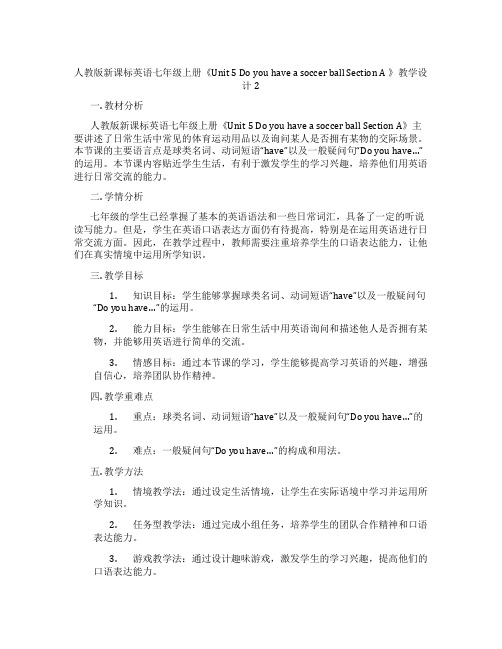
人教版新课标英语七年级上册《Unit 5 Do you have a soccer ball Section A 》教学设计2一. 教材分析人教版新课标英语七年级上册《Unit 5 Do you have a soccer ball Section A》主要讲述了日常生活中常见的体育运动用品以及询问某人是否拥有某物的交际场景。
本节课的主要语言点是球类名词、动词短语“have”以及一般疑问句“Do you have…”的运用。
本节课内容贴近学生生活,有利于激发学生的学习兴趣,培养他们用英语进行日常交流的能力。
二. 学情分析七年级的学生已经掌握了基本的英语语法和一些日常词汇,具备了一定的听说读写能力。
但是,学生在英语口语表达方面仍有待提高,特别是在运用英语进行日常交流方面。
因此,在教学过程中,教师需要注重培养学生的口语表达能力,让他们在真实情境中运用所学知识。
三. 教学目标1.知识目标:学生能够掌握球类名词、动词短语“have”以及一般疑问句“Do you have…”的运用。
2.能力目标:学生能够在日常生活中用英语询问和描述他人是否拥有某物,并能够用英语进行简单的交流。
3.情感目标:通过本节课的学习,学生能够提高学习英语的兴趣,增强自信心,培养团队协作精神。
四. 教学重难点1.重点:球类名词、动词短语“have”以及一般疑问句“Do you have…”的运用。
2.难点:一般疑问句“Do you have…”的构成和用法。
五. 教学方法1.情境教学法:通过设定生活情境,让学生在实际语境中学习并运用所学知识。
2.任务型教学法:通过完成小组任务,培养学生的团队合作精神和口语表达能力。
3.游戏教学法:通过设计趣味游戏,激发学生的学习兴趣,提高他们的口语表达能力。
六. 教学准备1.教师准备:提前准备好教学课件、球类图片、实物球类等教学资源。
2.学生准备:预习本节课内容,了解球类名词和动词短语“have”的用法。
Unit 5 Do you have a soccer ball 七年级上课文原文及重点
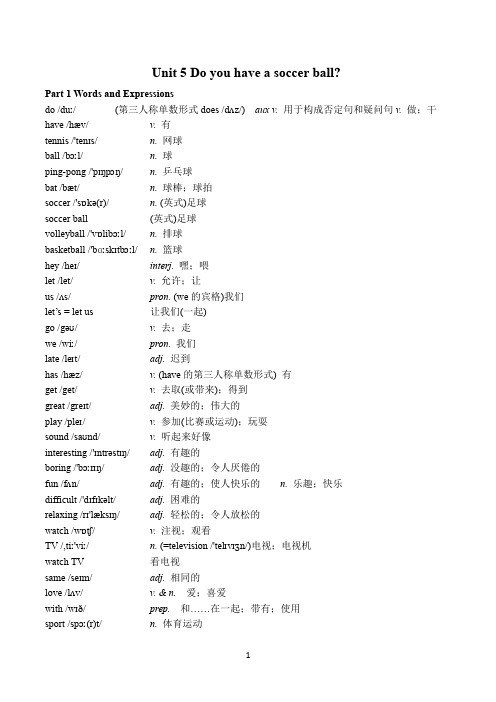
Unit 5 Do you have a soccer ball?Part 1 Words and Expressionsdo /duː/ (第三人称单数形式does /dʌz/) aux v.用于构成否定句和疑问句v.做;干have /hæv/ v.有tennis /'tenɪs/ n. 网球ball /bɔːl/ n.球ping-pong /'pɪŋpɔŋ/ n. 乒乓球bat /bæt/ n. 球棒;球拍soccer /'sɒkə(r)/ n. (英式)足球soccer ball (英式)足球volleyball /'vɒlibɔːl/ n.排球basketball /'bɑːskɪtbɔːl/ n.篮球hey /heɪ/ interj.嘿;喂let /let/ v. 允许;让us /ʌs/ pron. (we的宾格)我们let’s = let us 让我们(一起)go /gəʊ/ v.去;走we /wiː/ pron.我们late /leɪt/ adj. 迟到has /hæz/ v. (have的第三人称单数形式) 有get /get/ v.去取(或带来);得到great /greɪt/ adj.美妙的;伟大的play /pleɪ/ v. 参加(比赛或运动);玩耍sound /saʊnd/ v.听起来好像interesting /'ɪntrəstɪŋ/ adj.有趣的boring /'bɔːrɪŋ/adj.没趣的;令人厌倦的fun /fʌn/ adj.有趣的;使人快乐的n.乐趣;快乐difficult /'dɪfɪkəlt/ adj. 困难的relaxing /rɪ'læksɪŋ/ adj.轻松的;令人放松的watch /wɒtʃ/ v.注视;观看TV /,tiː'viː/ n. (=television /'telɪvɪʒn/)电视;电视机watch TV看电视same /seɪm/ adj. 相同的love /lʌv/ v. & n. 爱;喜爱with /wɪð/ prep.和……在一起;带有;使用sport /spɔː(r)t/ n. 体育运动them /ðəm/ pron. (they的宾格) 他(她、它)们only /'əʊnli/ adv.只;仅like /laɪk/ v. 喜欢;喜爱easy /'iːzi/ adj.容易的;不费力的after /'ɑːftə(r)/prep. & conj.在……之后class /klɑːs/ n.班级;课classmate /'klɑːsmeɪt/ n.同班同学Bill /bɪl/比尔(男名)Part 2:Texts课文(一)Cindy:Hey, Helen, let’s go! We’re late!Helen: OK.Cindy: Do you have the baseball?Helen: Yes, I do. It’s in my bag.Cindy: And where’s our baseball bat?Helen: Bill has it.Cindy: Oh, yeah. And do you have your jacket?Helen: Oh, no, I don’t. It’s on the chair. Let me get it. Cindy: And your hat, too!Helen: OK, I have my jacket and hat. Let’s go!Structure1. Do you have a baseball?Yes, I do./No, I don’t. I have a volleyball.2. Do you have a ping-pong bat?Yes, I do./No, I don’t. I have a ping-pong ball.3. Does she have a tennis ball?Yes, she does./No, she doesn’t. She has a baseball.4. Does he have a soccer ball?Yes, he does./No. he doesn’t. He has two ping-pong bats. 5. Do they have a basketball?句型:—Do/Does sb. have…?—Yes, sb. do / does.—No, sb. don’t / doesn’t.Write each word in the correct place in the chart.将方框中的单词填入表格中正确的位置。
人教版七年级上册英语Unit5Doyouhaveasoccerball
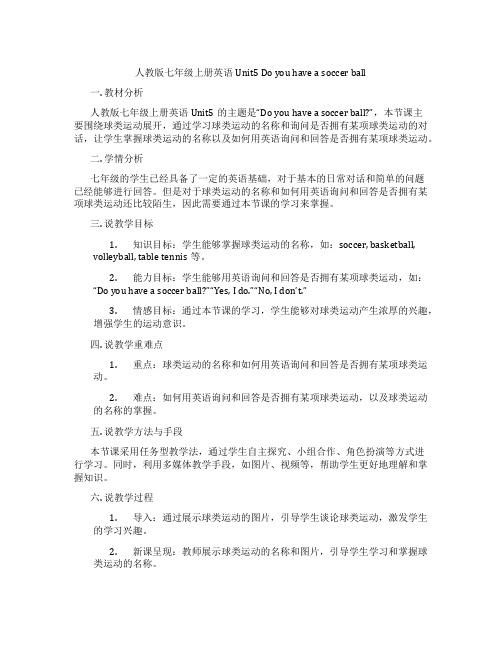
人教版七年级上册英语Unit5 Do you have a soccer ball一. 教材分析人教版七年级上册英语Unit5的主题是“Do you have a soccer ball?”,本节课主要围绕球类运动展开,通过学习球类运动的名称和询问是否拥有某项球类运动的对话,让学生掌握球类运动的名称以及如何用英语询问和回答是否拥有某项球类运动。
二. 学情分析七年级的学生已经具备了一定的英语基础,对于基本的日常对话和简单的问题已经能够进行回答。
但是对于球类运动的名称和如何用英语询问和回答是否拥有某项球类运动还比较陌生,因此需要通过本节课的学习来掌握。
三. 说教学目标1.知识目标:学生能够掌握球类运动的名称,如:soccer, basketball,volleyball, table tennis等。
2.能力目标:学生能够用英语询问和回答是否拥有某项球类运动,如:“Do you have a soccer ball?”“Yes, I do.”“No, I don’t.”3.情感目标:通过本节课的学习,学生能够对球类运动产生浓厚的兴趣,增强学生的运动意识。
四. 说教学重难点1.重点:球类运动的名称和如何用英语询问和回答是否拥有某项球类运动。
2.难点:如何用英语询问和回答是否拥有某项球类运动,以及球类运动的名称的掌握。
五. 说教学方法与手段本节课采用任务型教学法,通过学生自主探究、小组合作、角色扮演等方式进行学习。
同时,利用多媒体教学手段,如图片、视频等,帮助学生更好地理解和掌握知识。
六. 说教学过程1.导入:通过展示球类运动的图片,引导学生谈论球类运动,激发学生的学习兴趣。
2.新课呈现:教师展示球类运动的名称和图片,引导学生学习和掌握球类运动的名称。
3.对话练习:学生两人一组,模拟对话场景,练习如何用英语询问和回答是否拥有某项球类运动。
4.小组活动:学生分成小组,进行角色扮演,模拟真实场景,运用所学知识进行对话。
人教版新课标英语七年级上册《Unit 5 Do you have a soccer ball Sec
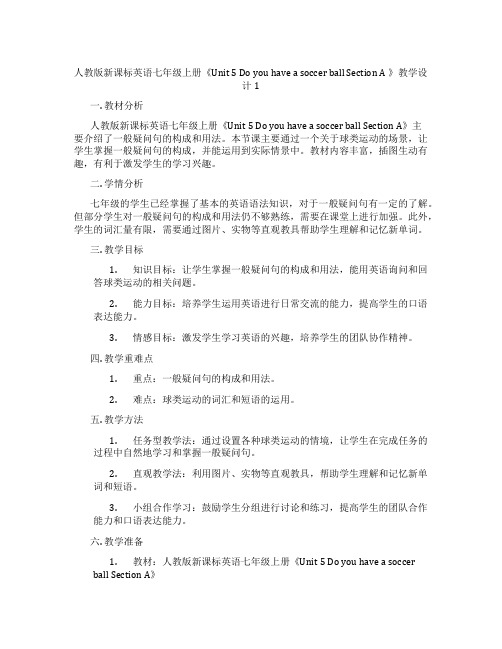
人教版新课标英语七年级上册《Unit 5 Do you have a soccer ball Section A 》教学设计1一. 教材分析人教版新课标英语七年级上册《Unit 5 Do you have a soccer ball Section A》主要介绍了一般疑问句的构成和用法。
本节课主要通过一个关于球类运动的场景,让学生掌握一般疑问句的构成,并能运用到实际情景中。
教材内容丰富,插图生动有趣,有利于激发学生的学习兴趣。
二. 学情分析七年级的学生已经掌握了基本的英语语法知识,对于一般疑问句有一定的了解。
但部分学生对一般疑问句的构成和用法仍不够熟练,需要在课堂上进行加强。
此外,学生的词汇量有限,需要通过图片、实物等直观教具帮助学生理解和记忆新单词。
三. 教学目标1.知识目标:让学生掌握一般疑问句的构成和用法,能用英语询问和回答球类运动的相关问题。
2.能力目标:培养学生运用英语进行日常交流的能力,提高学生的口语表达能力。
3.情感目标:激发学生学习英语的兴趣,培养学生的团队协作精神。
四. 教学重难点1.重点:一般疑问句的构成和用法。
2.难点:球类运动的词汇和短语的运用。
五. 教学方法1.任务型教学法:通过设置各种球类运动的情境,让学生在完成任务的过程中自然地学习和掌握一般疑问句。
2.直观教学法:利用图片、实物等直观教具,帮助学生理解和记忆新单词和短语。
3.小组合作学习:鼓励学生分组进行讨论和练习,提高学生的团队合作能力和口语表达能力。
六. 教学准备1.教材:人教版新课标英语七年级上册《Unit 5 Do you have a soccerball Section A》2.教具:球类运动的图片、实物、PPT等3.作业:提前准备相关的家庭作业,巩固所学内容七. 教学过程1.导入(5分钟)利用球类运动的图片或实物,引起学生的兴趣,然后用中文提问:“你们喜欢球类运动吗?为什么?”接着用英语提出一般疑问句:“Do you like ball games?”,引导学生用英语回答。
七年级英语上册《Unit 5 Do you have a soccer ball》知识点 (新版)人教版

Unit 5 Do you have a soccer ball?1. Do you have......? Yes, I do. No, I don’t..你有……吗?是的,我有。
不,我没有。
Do they have......? Yes, they do. No, they don’t..Does he have......? Yes, he does. No, he doesn’t.Does she have......? Yes, she does. No, she doesn’t.在一般现在时中,句子的谓语动词若是实义动词,常借助助动词do或does来构成否定句或疑问句。
Does用于主语是第三人称单数的句子中,其他情况用do。
2. do/does1)作助动词,帮助构成一般现在时的否定句或疑问句,无意义。
Do you have a soccer ball? 你有足球吗?I don’t know. 我不知道。
Does Jim have a sister? 吉姆有妹妹吗?What does he like? 他喜欢什么?He doesn’t like English. 他不喜欢英语。
2) 作实义动词,“做,干”。
I do my homework every day. 我每天都做家庭作业。
Bob does his homework every day. 鲍勃每天都做家庭作业。
3) 在一般现在时中,do/does 可用来替代上文出现过的动词,以避免重复。
Do you have a soccer ball? 你有足球吗?Yes, I do. 是的,我有。
(do 代have)Does she have an eraser? Yes, she does.I don’t have a soccer ball, but my brother Alan d oes.我没有足球,但我的哥哥艾伦有。
3.Let’s do sth. “(让)我们做某事吧。
人教版七年级英语上册英语教案:Unit 5 Do you have a soccer ballSec

Section A(2d-3c)
let, us, go, we, late, has, get, great,play,sound.
Do you have ...?Yes,Ido. No,Idon’t.
Does he/shehave ...?Yes, he/she does./No, he/she doesn’t.
Read and learn the new words.
Students listen to theteacher'sreading. And then read the dialoguebythemselves.
Read theGrammar focusand memorize keysentence patterns.
教学难点
The use of have's generalinterrogative sentence (applicable to the third person singular) and the affirmative and negative answer
教学设想
In this class, I plan to let the students master the new words and further deepen the students' understanding of the key sentence pattern throughreading practice.
审阅人
教学过程
教师活动
学生活动
设计意图
Step I: Greetings
Step II: Revision
人教版英语七年级上册Unit_5_Do_you_have_a__soccer_ball教材全解及单元

人教版英语七年级上册Unit 5 Do you have a soccer ball?教材全解及单元测试卷【教材内容解析】Section A1.soccer ball (P. 25)soccer ball表示“(英式)足球”。
I have a soccer ball.2.Do you have a ping pong bat? (P. 25)have用作及物动词,表示“有、拥有”,强调某人拥有某物。
I have a sister.He has a watch.3.Hey, Helen, let’s go! (P. 26)let’s do sth.意为“咱们做某事吧”,用于提出建议或者请求对方同自己一起做某事,肯定回答用OK, All right, That sounds great, Good idea等,否定回答用Sorry, I...。
---Let’s play basketball.---OK.【拓展】let’s包括说话者和听话双方;let us只包括说话者一方。
Let’s do our homework.Please, sir, let us go now.4.We’re late! (P. 26)late用作形容词,表示“迟到、晚的”,be late for表示“……迟到”。
I am never late for school.【拓展】late还可以用作副词,表示“迟地、晚地”。
Today he gets up late.5. Let me get it. (P. 26)get用作及物动词,意为“取、得到”。
We must open the door and get the ball.Can you get a banana for me?6.Well, let’s play basketball. (P. 27)play此处用作及物动词,意为“参加踢/打(球)”,后接球类名词时,前不用冠词。
七年级上册英语《Unit 5 do you have a soccer ball》同步卷和答案详解

人教新版七年级上册《Unit5Do you have a soccer ball?》同步练习卷(2)一、翻译:1.你有足球吗?Do you have?2.让我们不要迟到。
Let's.3.放学后,我喜欢和同学一起打篮球。
I like after school.4.我擅长踢足球。
I'm good.5.我爸爸只在电视上看篮球比赛。
My father only TV.6.我的爷爷对这部有趣且令人放松的电影很感兴趣。
My grandfather is interested in movie.7.莱奥梅西四岁时开始踢足球因为他踢球很开心。
Leo Messi started playing football at the age of four because he had much fun. 8.莉莉总是上学迟到。
Lily school.9.只有这两个男孩住在同一个城市。
live in the same city.10.他不喜欢吃水果但我喜欢。
He doesn't like eating apples but.二.补全对话11.A:Hello,long time no see.(1)?B:I'm fine,thanks.(2)?A:I'm OK.(3)?B:Yes,I like to play baseball very much.A:Me,too.I want to play baseball with my friends tomorrow.(4)?B:Yes.When and where shall we meet?A:Let's meet at8:00at the school gate.B:See you there.A:(5).三.短文填空12.Bob likes(1)(play)soccer after class.And he always plays it alone(独自地).TodayMiss White(2)(see)Bob(3)(play)in the playground. "Hi,Bob.What sport do you like?"Miss White(4)(ask)."Soccer,of course.I have3soccer(5)(ball).One is here,the other is at(6)(I)home,"Bob answers."I see.Why do you play it alone?You can play it with your classmates.""But it's my ball.I don't want(7)(play)it with others.""Is it(8)(interest)to play alone?"Miss White asks."No,it isn't.And it's a little boring,"Bob looks at his ball and(9)(say)."Share(分享)your ball with your classmates.I'm sure you will have fun.Then Bob(10)(do)as(按照)Miss White says.And he really has a great time.He finds that sharing is fun.四.选择填空:13.I have____basketball.Let's play_____basketball.()A.an;/B.a;the C.the;a D.a;/14.Ted has eight ping﹣pong balls,______he doesn't play ping﹣pong.()A.and B.but C.so D.only15.Let's____for a walk,shall we?()A.to go B.going C.go D.gone16.I____a volleyball and he____a tennis ball.()A.have;have B.have;has C.has;have D.has;has 17.We play soccer_____our friends after school.()A.at B.with C.in D.after 18.The girl______every Sunday.()A.play sport B.plays sportC.play sports D.plays sports19.一______is my computer game?一I think it's on the table.()A.What B.How C.Who D.Where20.______are good friends.()A.I and Bob B.Bob with I C.Bob and I D.I with Bob 21.My brother and my cousin_________school.()A.go the same B.go to the sameC.go to same D.go same22.﹣Let's play tennis.﹣________.()A.Thank you B.Yes,pleaseC.That sounds good D.You're welcome五..完形填空23.Hi,I'm Bob.I have(1)good friends.They're Gina,Tom and Jack.Gina is a nice girl.She likes reading.You can see(2)everywhere in her room.Tom likes (3).He has two baseballs,five(4)and three basketballs.He(5)sports with his classmates every day.He thinks it's(6).Jack likes sports,too.(7)he doesn't play sports.He only(8)them on TV.I don't like sports.I think it's boring.I (9)a computer.I like playing games on it.But my mother doesn't(10)me do that on school days.I can only play computer games on weekends(周末).(1)A.two B.three C.four D.five(2)A.books B.keys C.jackets D.pictures(3)A.purple B.numbers C.English D.sports(4)A.rulers B.oranges C.volleyballs puters(5)A.plays B.asks C.knows D.calls(6)A.boring B.difficult C.interesting D.tidy(7)A.And B.But C.Too D.Only(8)A.sees B.meets C.says D.watches(9)A.find B.like C.have D.play(10)A.ask B.let C.call D.say一.翻译24.他妹妹在同一个学校但是在不同的班级。
- 1、下载文档前请自行甄别文档内容的完整性,平台不提供额外的编辑、内容补充、找答案等附加服务。
- 2、"仅部分预览"的文档,不可在线预览部分如存在完整性等问题,可反馈申请退款(可完整预览的文档不适用该条件!)。
- 3、如文档侵犯您的权益,请联系客服反馈,我们会尽快为您处理(人工客服工作时间:9:00-18:30)。
a. T: Let’s read the words together.
b. T: Who would like to read them to the class?
Step 3: Section A 3b
1.Fill in the blanks withdoordoes. Then pra ctice the conversations with your partner.
Does he/she have a soccer ball? Yes, he/she does. No, he/she doesn’ t.
重点难点
New words:tennis, bat, volleyball, basketball, televisio n, interesting, boring, fun, difficult, relaxing
b. T: Some of you have got it. Who can tell us your ideas?
Sentences:Do you/they have a TV? Yes, I/they do. No, I/they don’t.
Does he/she have a soccer ball? Yes, he/sh e does. No, he/she doesn’t.
教学方法
任务型教学、分级评价法、直观教学法、模仿示范法、情景教学和合作学习法
教学内容
New words:tennis, bat, volleyball, basketball, television, interesting, boring, fun, difficult, relaxing
Sentences:Do you/they have a TV? Yes, I/they do. No, I/they don’t.
3.Explain
a. T: In the conver sations, we learned how to use“let’s”. Would you please discuss when we use it with your friends and how to answer such sentences?
Step 1: Revision
1.Ask and answer
a. T: Would you please translate my words into Engl ish?网球、足球……
b. T: Who would like to make conversations using the pictures in the PPT?
a. T: Let’s move to activity 3b.
b. T: Please look at the conversations and read them together.
c. T: I would like you to read them in pairs.
d. T: Who would like to read them to the class? I will invite some pairs to read them to the class.
3.Translate into Chine se
a. T: Would you please translate the words into Chinese wi th your partners?
b. Who would like to translate them into Chinese for us?
2.Dictation
T: Please take out your dictation exercise books and let’s have a dictation.
Step 2: Grammar Focus
1.Readห้องสมุดไป่ตู้
T: Read the conversations in the grammar box.
2.Point out the notes
Section A3a
1.Write each word in the correct place in the chart.
T: Let’s go to activity3aon page 27.
2.Check the answers
T: Have you finished? Please check your answers with your partners.
学习方法
课前预习、课堂内外练习、听说读写结合
教学过程设计
个性化设计
教学步骤
Lead in:
T: What did we learn yes terday? Who can tell us? Yes. Yesterday we got to know how to talk about ownership and we also learned some sports words in English. Do you still remember them? OK, let’s review them first.
Unit5 Do you have a soccer ball?
The 2nd period (Section A2a–2c)
教学目标
1.Get the stude nts to learn how to greet people.
2.Get the students to learn to get other people’s basic inf ormation like names from the conversations.
2.Pairwork
a. T: Can you make conversations like the ones given?
b. T: Let’s make conversations in pairs.
c. T: Who would like to present their conversations to the class?
